‘It’s not a race. We’re in it for the long run,’ says director and CEO of National Gallery.
The start of 2020 was exciting for the Immersive van Gogh team: they’d joined with the Paris creators of Atelier des Lumières for a Toronto version of their eye-popping digital art experience and, with an eye to a spring opening, began construction in the industrial space that formerly housed the Toronto Star’s printing presses. Early ticket sales were promising.
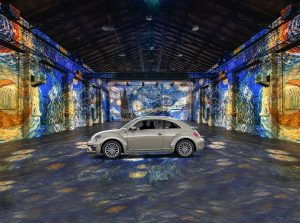
When the coronavirus pandemic hit, producers Corey Ross and Svetlana Dvoretsky watched as one cultural organization after another closed its doors in mid-March and Toronto went into lockdown. As they began to consider whether they’d have to lay off the dozens of arts workers creating the show and what they would tell ticketholders, Ross had a Eureka moment.
Realizing that the loading dock ramp he’d been driving up every week to enter the cavernous exhibition space during construction could also be the way to bring in visitors, Ross and Dvoretsky quickly pivoted toward transforming their walk-in show into a safe, physically distanced drive-in experience — at least to start out.
Adapting the exhibition has required a leap of faith because the show was originally designed to be experienced on foot by artists currently unable to enter Canada to oversee the transition, Ross said.
“Amazingly, it works,” he declared during a media preview this week.
“It is all about the ability to pivot right now and to change, as the world around us is changing. And still be able to deliver an experience that is exciting for the public to encounter.”
With regions across Canada gradually lifting coronavirus lockdowns, the arts-going experience is undergoing a pandemic-era revamp. Increased safety measures, innovative thinking and flexibility are paramount.
‘People have really missed the art gallery’
Members, front-line healthcare workers and their families were among the first who returned when the Vancouver Art Gallery reopened this week.
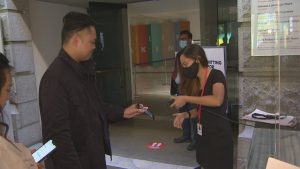
Visitors arrived at a specific time window booked in advance and were welcomed by masked staffers, who scanned tickets from mobile devices. Galleries now include markers reminding of physical distancing, hand sanitizer stations and directional guidance through the facility. Benches and high-touch elements like audio players have been removed. QR codes posted by artworks allow guests to scan and learn more.
“People have really missed the art gallery. It’s a safe place where you can come and it’s some return to normalcy, even though nothing is normal,” said Daina Augaitis, the gallery’s interim director.
To facilitate physical distancing, the gallery will limit the number of visitors. Staff are also planning ahead to offer seniors a dedicated entrance window on Monday mornings.
All these new measures are much appreciated, according to those who visited during a free session the gallery extended to frontline workers and their families.
“I haven’t been downtown in four months, so this is literally the first place I’m visiting,” said Julian Augustine, who made the visit from Port Moody, B.C., with fellow nurse Tricia Arceo.
“It’s our day off today. It’s just nice to have some sense of normalcy in our lives. Visiting a museum is a nice way to start the day.”
Karen Choi, an occupational therapist who brought her daughter and was in search of a break in their routine, echoed that sentiment.
“Being in the middle of the pandemic and not being able to do anything, I welcomed the opportunity,” Choi said. “I love it. It reminds me about how I should come to the art gallery much more frequently.”
That’s exactly what Kevin Rice, director of the Confederation Centre Art Gallery, is hoping for. “We’re really excited to invite people to visit the gallery if they haven’t been regular visitors,” he said.
The Charlottetown gallery also reopened this week, as part of the cultural venue’s gradual opening of a number of its facilities. Visitors to the Prince Edward Island institution will see similar protocols similar to those at the Vancouver Art Gallery, such as controlled entrance and exits, new directional information, increased cleaning, as well as limits on visitor capacity.
‘Not opening up isn’t really an option’
“If [people have] gone to the grocery store or the drugstore, they’ve been out in public spaces, I think they will not feel like there’s anything unusual for them here,” Rice noted, saying that the staff’s aim was to follow heath guidelines while also creating a space where visitors feel safe, comfortable and not rushed.
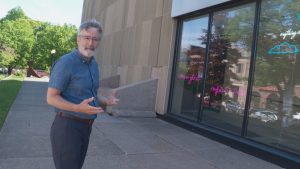
“We’ve been able to do that fairly readily because we have big, beautiful spaces and lots of interesting art for people to see when they do visit.”
Reopening safely and responsibly is imperative for the arts sector, said Confederation Centre CEO Steve Bellamy.
“People need culture,” he said. “We need to learn how to operate within the risks involved, rather than not operate… Not opening up isn’t really an option.”
Despite these precautions however, many Canadians may be reticent to return. A recent study conducted by Nanos Research on behalf of the National Arts Centre and Business for the Arts asked Canadians about returning to cultural events. Respondents fell into two camps: those hungry to immediately return and a larger, more hesitant group.
“About a third of people indicated that as soon as the government allows, they’re going to be returning immediately to the [cultural] sector,” said Shannon Urie, associate director of marketing for the National Arts Centre in Ottawa. Respondents in Quebec expressed a greater intent to go back to museums and galleries right away.
“Another third [of total respondents] said that they’re going to wait about five months or until the vaccine is ready, to return. And then another third were really unsure.”
The report also discovered that during the pandemic, regular culture-goers have checked out digital or virtual activities — a livestreamed performance, for example — and that’s worth paying attention to, according to Urie.
“To us, [it] signals that there is demand for this. That looking forward to the future, there would be some interest in continuing on in that sort of realm,” she said.
“Many cultural organizations are using this very important time to innovate, to think about perhaps breaking patterns that are decades long… It’s been a tremendous period of learning for everyone.”
Beyond the myriad physical considerations for reopening — as well as planning for an expected second wave of infection to come — arts organizations have to drastically rethink how to operate and innovate in the longer term, according to National Gallery of Canada CEO Sasha Suda.
“It’s not a race. We’re in it for the long run,” said Suda, who is currently prepping plans to reopen in July.
Arts organizations’ business models have become reliant on audiences,she said.
Suda foresees that art lovers will no longer be “gathered with 200 people in a single gallery” crowding in around one particular painting or sculpture.
“Those things, we simply can’t encourage in our exhibition design,” Suda said. “It’s going to make us be creative and resourceful about how we invite our audience, our community, to come experience art.”
CBC/MS





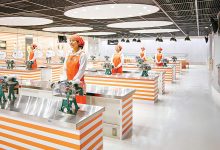
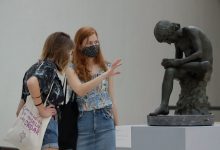

Redes Sociais - Comentários